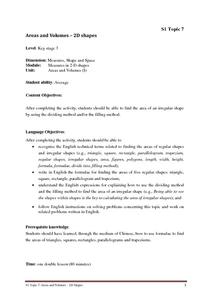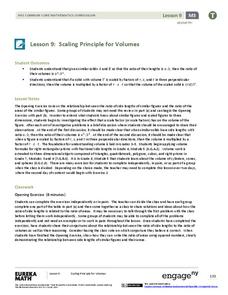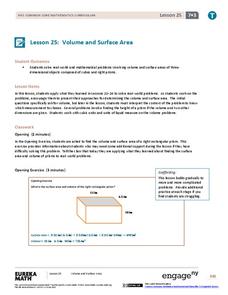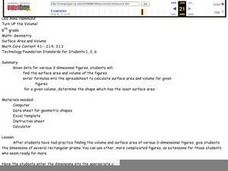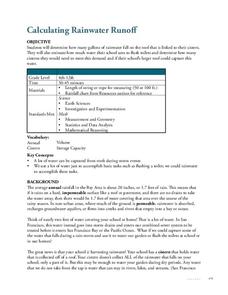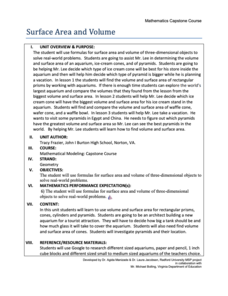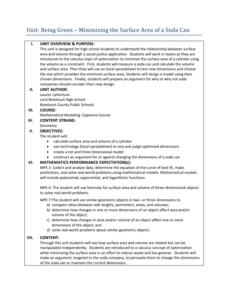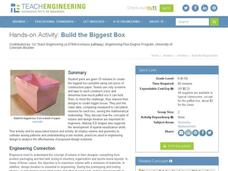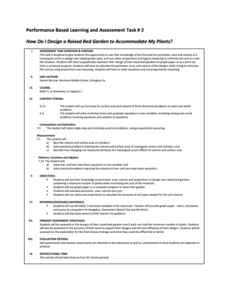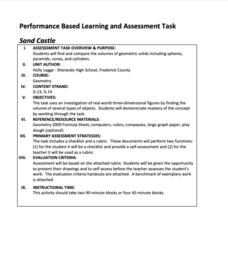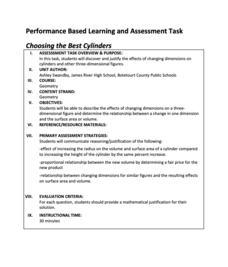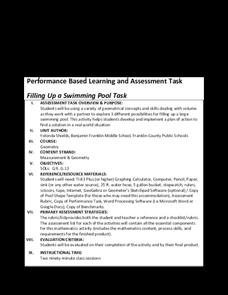Government of Hong Kong
Areas and Volumes - 2D Shapes
Unfortunately for young mathematicians, the world isn't made entirely of parallelograms, triangles, and trapezoids. After first learning the area formulas for these common shapes, students apply this new knowledge to...
Virginia Department of Education
Surface Area and Volume
Partners use materials to wrap three-dimensional objects to determine the formula for surface area. The groups use an orange to calculate the amount of peel it takes to completely cover the fruit. Using manipulatives, individuals then...
EngageNY
Scaling Principle for Volumes
Review the principles of scaling areas and draws a comparison to scaling volumes with a third dimensional measurement. The exercises continue with what happens to the volume if the dimensions are not multiplied by the same...
EngageNY
The Scaling Principle for Area
As they investigate scaling figures and calculate the resulting areas, groups determine the area of similar figures. They continue to investigate the results when the vertical and horizontal scales are not equal.
EngageNY
Volume and Surface Area
The 26th part of a 28-part series requires pupils to determine whether the answer to a problem requires surface area or volume. The class works problems about fish tanks that prompt individuals to decide, based on the question, which...
EngageNY
Volume of Right Prisms
Apply volume and area formulas to find the volume of any right prism. The 26th lesson of a 29-part module examines methods for finding the volume of right prisms with varying shapes of bases. Learners use the formula V = Bh to find...
Illustrative Mathematics
Painting a Barn
When painting a barn you have to calculate surface area, and that is exactly what this resource is about. Not only will your future home owners calculate the surface area, but also the cost. It is a real-life problem that every that...
Curated OER
Turn Up the Volume
Measuring volume can be a mystery for 5th graders, but this hands-on activity gives the gift of discovery. The volume of simple rectangular solids and irregular shapes are calculated through various methods including displacing liquid in...
University of Houston
Volume for Rectangular Prisms
Upper graders define perimeter and area of a rectangle, estimate numbers of cubes and determine the maximum amount that will fit in a given space. In this math lesson, pupils complete related worksheet, build prisms and find volume and...
Virginia Department of Education
Exploring 3-D Geometry
Take young mathematicians on an exploration of the world of 3-D geometry with this seven-lesson unit. After first defining the terms perimeter, area, and volume and how they apply to the real world, students continue on...
Techbridge Curriculum
Calculating Rainwater Runoff
Thirsty plants soak up every bit of a rainfall, but what happens to the rain that hits the roof? Calculate the amount of rainwater from your school's roof with an Earth science activity, which brings measurement skills, observation...
Radford University
Surface Area and Volume
Who knew there were pyramids in China? Learners apply surface area and volume formulas to several different real-world situations. They calculate the volume and surface area of an aquarium, an ice cream cone, and Egyptian and Chinese...
Radford University
Being Green – Minimizing the Surface Area of a Soda Can
Save the world by designing a new soda can! Learners first measure the dimensions of a typical soda can and calculate its surface area and volume. They then use spreadsheet software to minimize the surface area for the volume, thus...
Teach Engineering
Boxed In and Wrapped Up
If cubes have the smallest surface area, why aren't there more cube-shaped packages? Scholars take a box in the shape of a rectangular prism, cut it up, and make new boxes in the shape of cubes with the same volume. They then brainstorm...
Teach Engineering
Build the Biggest Box
Boxing takes on a whole new meaning! The second installment of the three-part series has groups create lidless boxes from construction paper that can hold the most rice. After testing out their constructions, they build a new box....
Illustrative Mathematics
Christo’s Building
Hook your charges on how to solve a real-world art problem with mathematics by showing works of Christo. You can find eye-catching images on the Christo and Jeanne Claude webpage. Here, math learners help Jean Claude and Christo prepare...
Teach Engineering
Determining Densities
Don't be dense—use a robust resource. The second installment of a five-part Floaters and Sinkers unit has learners determine the densities of several objects. As part of the activity, they learn the displacement method for finding...
Mathematics Vision Project
Module 5: Circles A Geometric Perspective
Circles, circles, everywhere! Pupils learn all about circles, central angles, inscribed angles, circle theorems, arc length, area of sectors, and radian measure using a set of 12 lessons. They then discover volume formulas through...
Teach Engineering
Floaters and Sinkers
Whatever floats your boat. Young engineers learn about density by measuring the masses and volumes of boxes filled with different materials. Using their knowledge of densities, they hypothesize whether objects with given densities will...
Radford University
How Do I Design a Raised Bed Garden to Accommodate My Plants?
Give plants the best place to grow. Given constraints on plant spacing, pupils design a raised bed garden using graph paper, then calculate the perimeter, surface area, and volume. They use the provided costs of lumber and soil to...
Radford University
Sand Castle
Don't let the task slip through your fingers like sand. Scholars design sand castles using hemispheres, pyramids, cones, and cylinders of different sizes. They calculate the volume and surface area and consider how changing the...
Radford University
Choosing the Best Cylinders
Don't be fooled: the taller glass doesn't always hold the most. Given the dimensions of different cylindrical containers for beverages and popcorn, pupils calculate the volumes. They see how changing the dimensions affects the volume and...
NOAA
Through Robot Eyes
How do robots assist ocean explorers in collecting data and images? The final installment in a five-part series has science scholars examine underwater images collected by robots and identify the organisms shown. Groups then calculate...
Radford University
Filling Up a Swimming Pool Task
Swimming pools are no fun without water. For a pool in the shape of a trapezoidal prism, scholars first calculate the amount of water needed to fill the pool. They use experimental data on water flow to determine whether to haul water...
